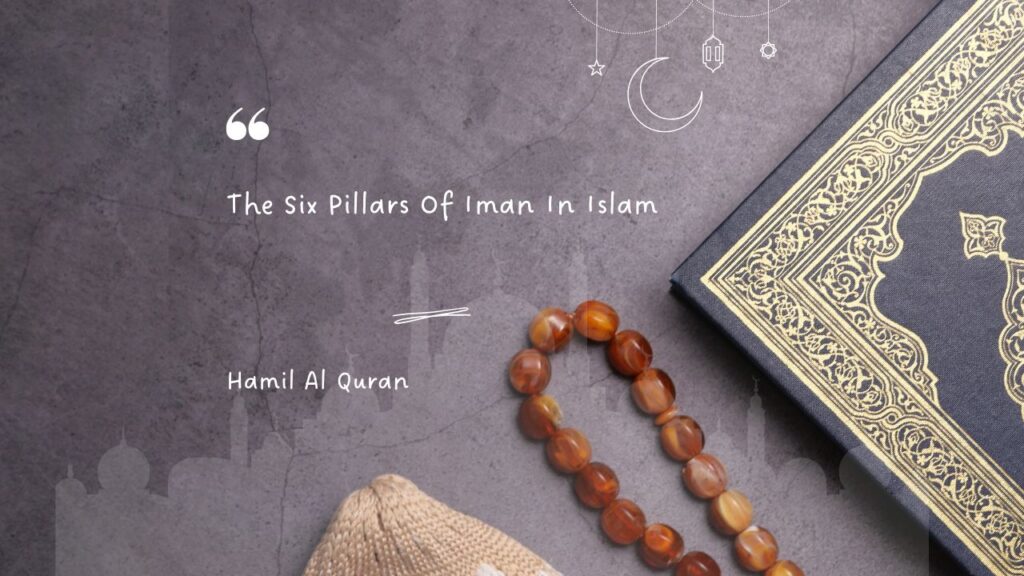Understanding the pillars of iman in Islam is essential. These pillars serve as the bedrock upon which the beliefs of a Muslim are built. They encompass fundamental concepts that shape one’s relationship with Allah and provide guidance for leading a righteous life.
1- Tawhid: Belief in the Oneness of Allah
Believing in the Oneness of Allah is the cornerstone of faith, as it encompasses a profound understanding that Allah is the only true deity worthy of worship. Tawhid’s significance in Islamic theology cannot be overstated as it forms the basis for all other pillars of iman. Understanding the concept of monotheism in Islam means recognizing that Allah is unique, without partners or associates. This belief goes beyond mere acknowledgment and requires a deep conviction that shapes every aspect of a Muslim’s life.
Tawhid serves as a guiding principle, reminding believers to direct their devotion solely towards Allah and not to associate any partners with Him. It emphasizes the absolute unity and sovereignty of Allah, affirming His unmatched power, wisdom, and knowledge. By acknowledging Tawhid, Muslims recognize that all creation is dependent on Allah alone and submit themselves entirely to His will.
In essence, Tawhid establishes a profound relationship between Muslims and their Creator. It fosters trust in Allah’s divine plan and provides solace during times of hardship or uncertainty. The concept further highlights the importance of seeking knowledge about Allah’s attributes and understanding His divine nature through studying the Qur’an and Prophetic traditions.
Overall, Tawhid plays a fundamental role in shaping Islamic theology by emphasizing monotheism as an essential component of faith. Believing in the Oneness of Allah enables Muslims to develop a profound connection with their Creator while striving to align their actions with His guidance.

2- Prophethood: Acceptance of Allah’s messengers
Embracing the divine messengers sent by Allah is pivotal to understanding and following the teachings of Islam. The acceptance of prophets is an essential part of the pillar of prophethood in Islam. Prophets are chosen by Allah to convey His message to humanity, providing guidance, wisdom, and examples of righteous living. They serve as a link between Allah and mankind, delivering revelations and clarifying any misconceptions about the faith.
Through their teachings, prophets show believers how to worship and submit to Allah’s will, leading a life that’s pleasing to Him. The role of messengers extends beyond mere communication; they’re also tasked with rectifying societal issues and guiding people to moral conduct. Messengers exemplify righteousness in their own lives, serving as role models for believers to imitate. Their words carry authority and divine inspiration.
Accepting the messengers means acknowledging their legitimacy and heeding their instructions without hesitation or doubt. Accepting prophets plays a crucial role in adhering to the pillars of Iman in Islam. By embracing these messengers sent by Allah, Muslims gain insight into the true teachings of God and are guided towards a path of righteousness and spiritual growth.
3- Divine Books: Belief in the scriptures revealed by Allah
Explore the profound wisdom and transformative power of Allah’s divine books, as they illuminate your path and ignite a fire of spiritual awakening within you. Belief in divine revelation is an essential pillar of Iman in Islam. The scriptures revealed by Allah serve as a beacon of guidance, offering insights into the purpose of life and providing solutions to the challenges we face.
When you study these sacred texts, you delve into a treasure trove of knowledge that transcends time and space.
- Divine Books as Mirrors: The scriptures reflect our innermost thoughts, desires, and struggles, allowing us to better understand ourselves.
- Divine Books as Guides: They offer practical guidance on how to live a righteous life, fostering personal growth and moral development.
- Divine Books as Connectors: They establish a direct connection between humanity and Allah, strengthening our relationship with Him through prayerful reflection.
Recognizing the importance of studying scriptures helps deepen our understanding of Islam’s teachings and enables us to apply them effectively in our lives. By embracing the divine books with open hearts and minds, we embark on a journey toward spiritual enlightenment.
Hamil Al Quran Academy, the Islamic online university Quran memorization offers free trials to learn Quran online and all related sciences.

4- Angels: Belief in the existence and role of angels
In Islamic theology, angels play a vital part in connecting the divine realm with the human world. These angelic beings are believed to be created from light and possess various levels of power and responsibility. They act as intermediaries between Allah and His creation, delivering messages from Him to prophets and conveying prayers from humans to Him.
Angels also record every individual’s deeds, both good and bad, which will be presented on the Day of Judgment. Their presence provides comfort and reassurance that Allah is always aware of our actions and needs.
Belief in angels is an essential pillar of faith for Muslims, emphasizing the intricate relationship between the seen and unseen worlds in Islamic belief.
5- Day of Judgment: Belief in the afterlife and accountability for actions
Prepare yourself, for on the Day of Judgment, you’ll be held accountable for your actions and face the consequences of your choices in the afterlife. This belief is one of the pillars of Iman in Islam.
The importance of good deeds can’t be overstated, as they determine our fate on this day. Muslims believe that Allah will judge every individual based on their intentions and actions during their lifetime. Those who’ve done righteous deeds will be rewarded with eternal bliss in paradise, while those who’ve committed evil deeds will face punishment in hellfire.
The concept of paradise is described as a place of unimaginable beauty, where believers will be reunited with their loved ones and experience never-ending happiness. On the other hand, hellfire is depicted as a place of torment and suffering for those who disbelieved or engaged in sinful acts without seeking forgiveness.
Understanding the Day of Judgment instills a sense of responsibility and accountability among Muslims. It serves as a reminder to strive towards righteousness and seek forgiveness for any wrongdoings before it’s too late.

6- Predestination: Belief in Allah’s divine decree and destiny
Now that we’ve discussed the concept of accountability for our actions on the Day of Judgment, let’s delve into another important aspect of faith in Islam: predestination. It’s believed that Allah has a divine plan for each individual’s life, and their destiny is predestined by Him. This belief in Allah’s decree and destiny is an essential pillar of Iman (faith) in Islam.
Understanding predestination can be challenging, as it raises questions about free will and personal responsibility. However, it’s crucial to trust in Allah’s wisdom and accept that everything happens according to His divine plan. Believing in predestination helps Muslims find solace during difficult times, knowing that every trial they face is part of Allah’s greater purpose.
Incorporating this belief into one’s life fosters patience, acceptance, and gratitude to the Creator. It reminds individuals to strive for righteousness while acknowledging their ultimate reliance on Allah’s guidance and mercy.
Here are three key points regarding predestination:
- Predestination emphasizes the notion that everything happens according to Allah’s will.
- Belief in predestination doesn’t negate personal effort or free will.
- Trusting in Allah’s divine plan brings peace and contentment to believers’ hearts.
The pillars of Faith are the higher grade to be a better Muslim and supported by the worship practices that are known as the 5 Pillars of Islam.
we will explore the major 3 Islam pillars that help you reach the Iman level as follows:
Importance of Prayer: The significance of daily prayers in Muslim worship
Incorporating the practice of daily prayers into your life is crucial for Muslims as it serves as a constant reminder of your devotion and reliance on Allah. The significance of daily prayers cannot be overstated, as it is one of the five pillars of Islam and an essential part of Muslim worship.
Regularly connecting with Allah through Islam prayer provides spiritual nourishment and strengthens the bond between the individual and their Creator. There are numerous benefits to maintaining a regular prayer practice. Firstly, it helps to establish discipline and structure in one’s daily routine, creating a sense of order and purpose. Moreover, prayer allows for self-reflection and introspection, providing an opportunity for individuals to seek forgiveness, express gratitude, and seek guidance from Allah. It also serves as a source of comfort during times of difficulty or distress.
By engaging in daily prayers, Muslims cultivate a deep connection with Allah and actively acknowledge His presence in every aspect of their lives. It reinforces their faith by reminding them that they are constantly reliant on Allah’s mercy, guidance, and protection. Ultimately, incorporating the practice of daily prayers into one’s life contributes to personal growth, spiritual fulfillment, and a stronger relationship with Allah.

Charity: The obligation to give to those in need
Engaging in acts of charity, Muslims have a responsibility to extend their helping hand to those in need and alleviate their suffering. The importance of Zakat can’t be overstated as it’s one of the five pillars of Islam. Zakat is a mandatory form of charity that requires Muslims to give a portion of their wealth to those less fortunate.
By fulfilling this obligation, Muslims not only help others but also purify their own souls and strengthen their relationship with Allah.
In addition to Zakat, Muslims are encouraged to practice Sadaqah, which refers to voluntary acts of giving. Sadaqah can take many forms, such as donating money or providing assistance to those in need. This act of kindness is seen as a virtue and an opportunity for Muslims to earn rewards from Allah. It serves as a reminder that generosity should be part of one’s character and an essential aspect of worship.
The Charity holds great significance in Islam. Through Zakat and Sadaqah, Muslims fulfill their duty towards those less fortunate while also earning spiritual rewards and strengthening their faith.
Hajj: The pilgrimage to Mecca as a pillar of faith
Embark on the sacred journey of Hajj, as you make your pilgrimage to Mecca and deepen your faith. The rituals of Hajj are not merely a series of physical actions; they hold a deep spiritual significance for every Muslim.
This pillar of Islam dates back to the time of Prophet Ibrahim, who was instructed by Allah to build the Kaaba in Mecca. Each ritual performed during Hajj symbolizes an aspect of Ibrahim’s life and devotion to God. From circling the Kaaba during Tawaf, to running between Safa and Marwa in remembrance of Hajar’s search for water, every step taken holds historical significance.
The rituals allow pilgrims to connect with the rich history of their faith and cultivate a profound sense of unity among Muslims worldwide. By participating in these rites, you join millions of fellow believers in fulfilling this important obligation and strengthening your relationship with Allah.

Conclusion
Understanding and adhering to the pillars of Iman in Islam is essential for every Muslim. These pillars provide a solid foundation for one’s faith and guide them to a closer relationship with Allah.
By embracing Tawhid, Prophethood, Divine Books, Angels, Day of Judgment, Predestination, Prayer, Charity, and Hajj, believers can strengthen their theological knowledge and deepen their connection with the divine.
It is through these pillars that Muslims find purpose, guidance, and fulfillment in their religious journey. May we all strive to uphold these principles and embody the teachings of Islam in our lives.
